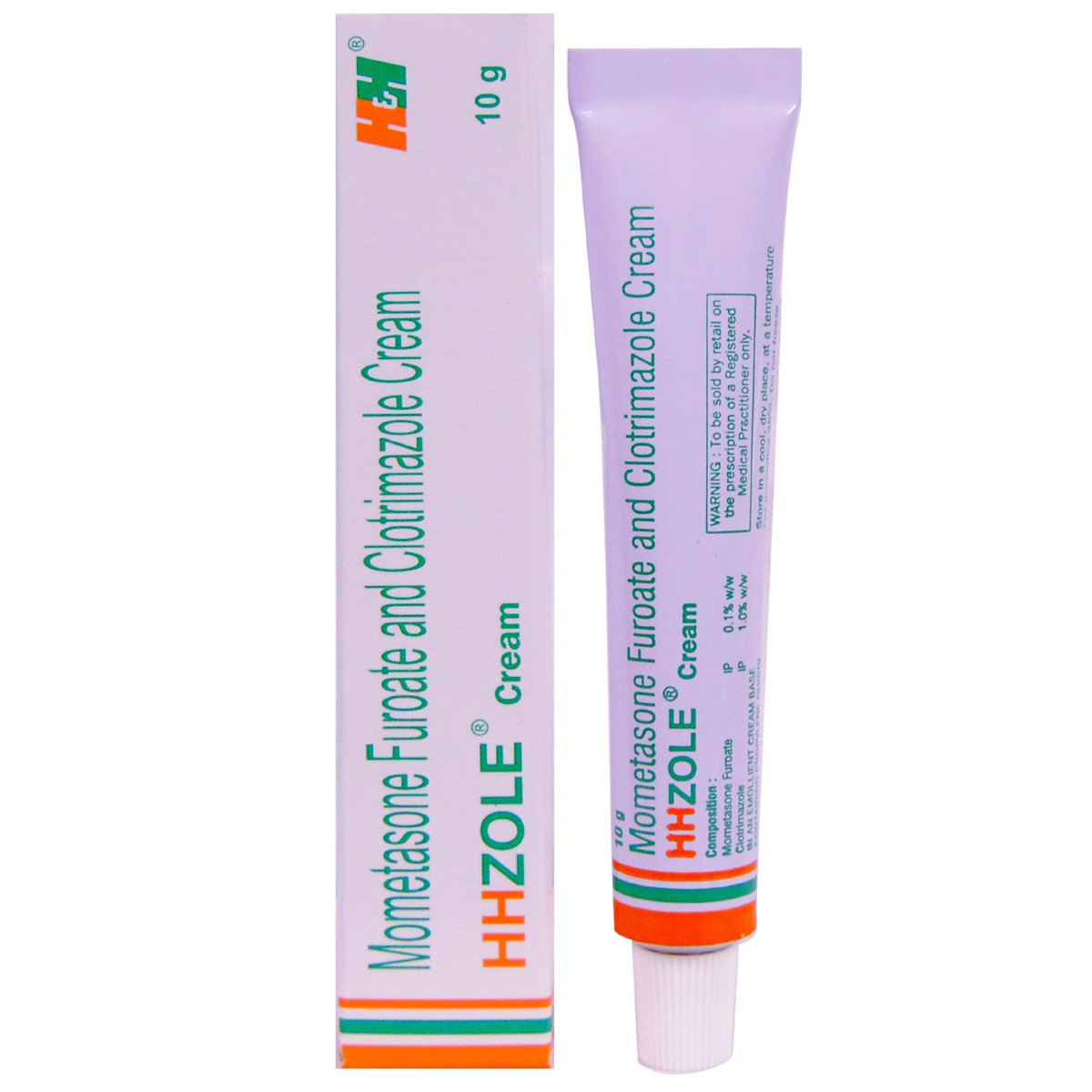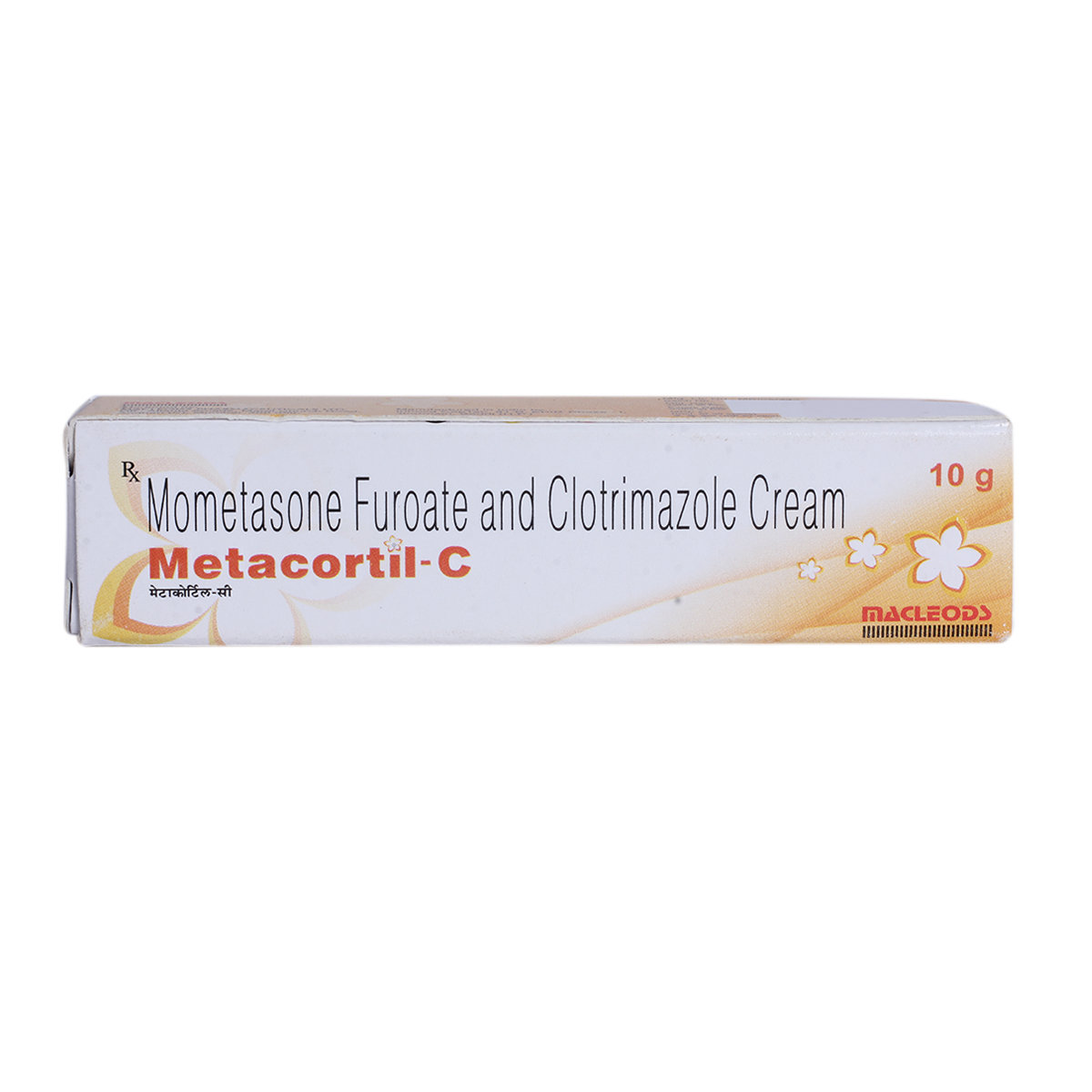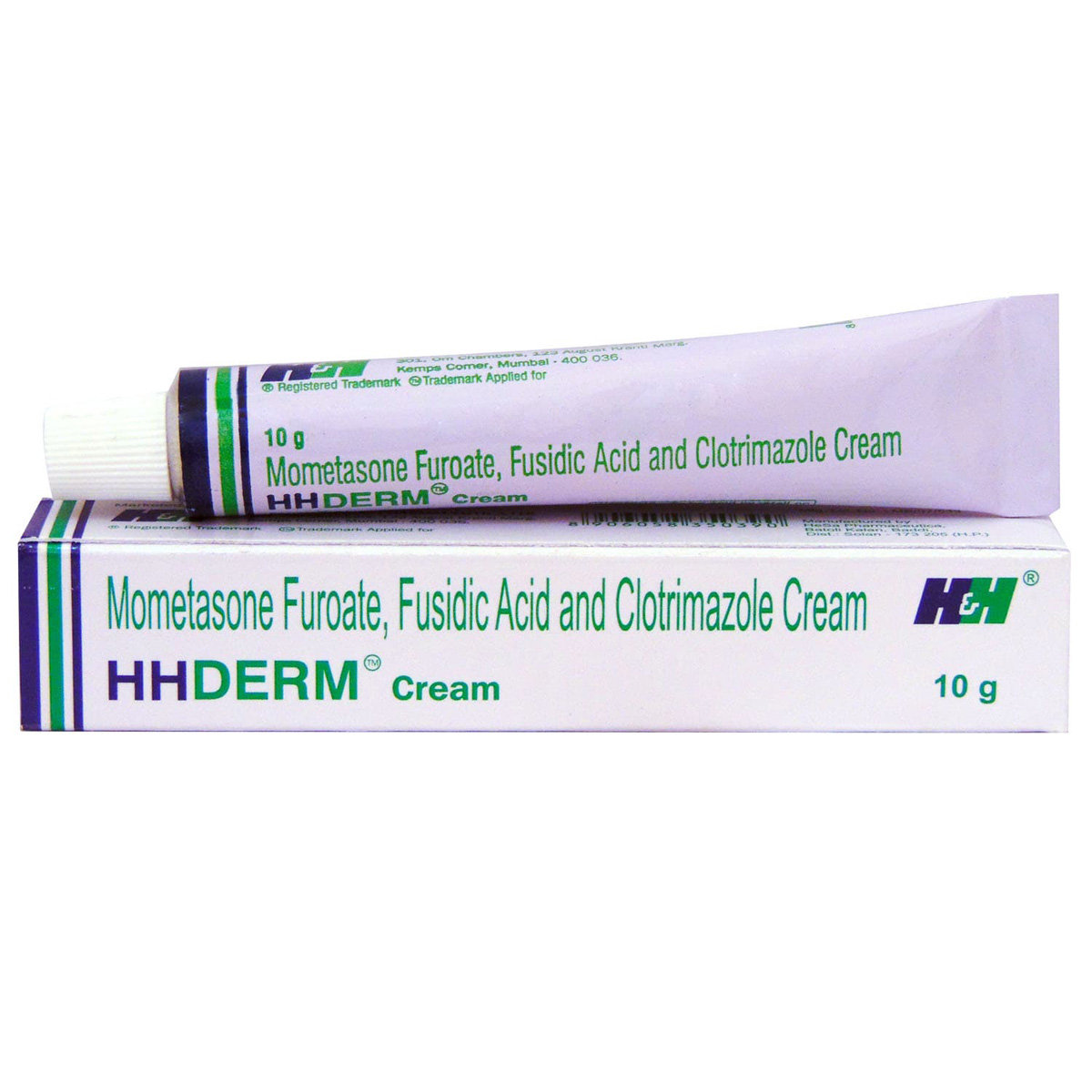Mometasone+clotrimazole
About Mometasone+clotrimazole
Mometasone+clotrimazole is a dermatological medication primarily used to treat fungal skin infections, such as eczema (inflamed, itchy, cracked and rough skin patches), psoriasis (skin cells multiply rapidly to form bumpy (uneven) red patches covered with white scales), ringworm, athlete's foot, jock itch, nasal polyps (painless growth on the lining of the nose or sinuses) and dermatoses (lesions or eruptions of the skin). Fungal skin infection occurs when a fungus invades and affects the tissue on the skin.
Mometasone+clotrimazole is composed of two medicines: Mometasone and Clotrimazole. Mometasone belongs to the class of corticosteroids. Corticosteroids have anti-inflammatory, immunosuppressive and antiproliferative (inhibit cell growth) properties. It blocks the production of prostaglandins (chemical messengers) that make the affected area red, swollen and itchy. Mometasone effectively treats inflammation and itchiness caused by eczema and psoriasis. On the other hand, Clotrimazole is an antifungal medication that treats fungal infections, such as athlete's foot, jock itch and ringworm. It stops the growth of fungi by causing damage and leakage to the fungal cell membrane.
Your doctor will advise the appropriate dose that suits your infection. Mometasone+clotrimazole is for topical (for skin) use only. Mometasone+clotrimazole has common side effects like itching, dryness, redness and burning sensation at the application site. These side effects usually do not require medical attention and gradually resolve over time.
Inform your doctor if you are allergic to any of the components in Mometasone+clotrimazole. Let your doctor know if you have any other skin disorders or illnesses before starting Mometasone+clotrimazole. Do not use Mometasone+clotrimazole on sensitive areas like nostrils, ears, lips or genitals if the doctor did not advise you. Mometasone+clotrimazole is not recommended for diaper rash. Pregnant and breastfeeding mothers should consult the doctor before starting Mometasone+clotrimazole.
Uses of Mometasone+clotrimazole
Medicinal Benefits
Mometasone+clotrimazole is used to treat fungal skin infections, eczema, psoriasis, ringworm, athlete's foot, jock itch, nasal polyps and dermatoses. Mometasone+clotrimazole is composed of Mometasone and Clotrimazole. Mometasone is a corticosteroid and blocks prostaglandin's production (chemical messengers) that make the affected area red, swollen and itchy. It effectively treats inflammation and itchiness caused by eczema and psoriasis. On the other hand, Clotrimazole is an antifungal drug that stops the growth of fungi by causing damage and leakage to the fungal cell membrane.
Directions for Use
Storage
Side Effects of Mometasone+clotrimazole
- Itching
- Dryness
- Redness
- Burning sensation at the skin's application site
Drug Warnings
Avoid contact of topical Mometasone+clotrimazole with nose, mouth or eyes as it may irritate. In case Mometasone+clotrimazole comes in contact with these areas accidentally, rinse with water thoroughly. Topical use of corticosteroids (Mometasone) sometimes causes systemic immunosuppression (decreased ability to fight infections) while treating infections. This condition worsens the infections, hence Mometasone+clotrimazole should be used with caution in patients with active infections. Do not use Mometasone+clotrimazole for treating diaper rash. Pregnant and breastfeeding mothers should consult the doctor before starting Mometasone+clotrimazole.
Drug Interactions
Drug-Drug Interaction: Let your doctor know about the medicines you use, including herbal supplements, vitamins, and other topical medicines.
Drug-Food Interaction: There are no studies indicating food interactions with Mometasone+clotrimazole.
Drug-Disease Interaction: Inform your doctor if you have a medical history of allergic reactions to medicines and other skin problems.
Drug-Drug Interactions Checker List:
Safety Advice

Alcohol
safe if prescribedNo interaction found/ established. Please consult your doctor before using Mometasone+clotrimazole.

Pregnancy
cautionLet your doctor know if you are planning to become pregnant or already pregnant before starting Mometasone+clotrimazole.

Breast Feeding
cautionThere are limited studies on how Mometasone+clotrimazole affects breastfeeding. Please consult the doctor before using Mometasone+clotrimazole if you are a nursing mother. However, it is advised not to use Mometasone+clotrimazole on breasts before breastfeeding your baby.

Driving
safe if prescribedMometasone+clotrimazole has no or negligible influence on the ability to drive or use machines.

Liver
cautionLet your doctor know if you have any history of liver diseases or hepatic impairment before using Mometasone+clotrimazole

Kidney
cautionLet your doctor know if you have any history of kidney diseases before using Mometasone+clotrimazole.

Children
cautionMometasone+clotrimazole is not recommended in children below two years of age.
Habit Forming
Diet & Lifestyle Advise
- Use mild soap while taking baths and prefer warm baths.
- Regularly change your socks and wash your feet. Avoid shoes that make your feet sweaty and hot.
- Do not walk barefoot at places like gym showers to prevent infections.
- Do not scratch the affected area of skin as it can spread the infection to other body parts.
- Avoid sharing towels, combs, bedsheets, shoes or socks with others.
- Wash your bed sheets and towels regularly.
- Avoid or limit the intake of alcohol and caffeine.
- Manage stress, eat healthily, drink plenty of water, exercise regularly and get plenty of sleep.
Special Advise
It is advised to reach out to your doctor if the skin infection symptoms persist or worsen after two weeks of treatment.
Patients Concern
Disease/Condition Glossary
Fungal skin infection: A fungal infection of the skin occurs when the fungus invades the skin tissue. Fungal infections can be contagious and spread from one person to another. Symptoms include skin irritation, scaly skin, redness, itching, scaly or flaky patches, and swelling. The most common type of fungal infections are ringworm, athlete's foot, jock itch, athlete's foot, and yeast infections. A ringworm is a common fungal infection of the skin or scalp and causes a rash resembling a worm in a ring shape. An athlete's foot is a fungal infection between the toes due to sweating. Jock itch is a fungal infection in the skin of the genitals, inner thighs and buttocks.
Eczema: It is a condition in which skin patches become inflamed, itchy, cracked, and rough. Symptoms include a rash on the arms and behind the knees. Eczema can be triggered by various factors like foods, drinks, skin products, soaps, chemicals, detergents, make-up products, chlorinated pool, and stress.
Psoriasis: It is a skin disorder in which skin cells multiply and form bumpy (uneven) red patches covered with white scales. Psoriasis symptoms include red patches on the skin, dry, cracked skin, swollen joints, and itching sensation.
FAQs
Mometasone+clotrimazole consists of Mometasone and Clotrimazole. Mometasone, a corticosteroid, works by blocking prostaglandin's production (chemical messengers) that make the affected area red, swollen and itchy. Clotrimazole is an antifungal medication and interferes with fungi's growth by causing damage and leakage to the fungal cell membrane.
Mometasone+clotrimazole is for topical (for skin) use only. Do not put bandage or dressing on the affected area while treating with Mometasone+clotrimazole unless the doctor advised. If the medicine gets into your eyes, nose, mouth or vagina, rinse with cold water. Do not apply Mometasone+clotrimazole on open wounds, lesions and blisters.
Please consult your doctor before using Mometasone+clotrimazole if you have other viral skin infections, diaper rash, diabetes, Cushing's disease (high cortisol levels), cataract and glaucoma, heart, liver, and kidney diseases. Let your doctor know if your allergic to Mometasone+clotrimazole or any of its components.
Mometasone+clotrimazole consists of corticosteroid (Mometasone) that may cause a rise in blood sugar levels by suppressing insulin secretion. Hence it is advised to consult your doctor before starting Mometasone+clotrimazole.
Mometasone+clotrimazole is not recommended to use for diaper rash, since Mometasone can be systemically absorbed and cause adrenal suppression, Cushing's syndrome and intracranial hypertension (pressure of the fluid that surrounds the brain). Your baby's paediatrician may suggest other medications for the treatment of diaper rash.
Mometasone+clotrimazole, when used for longer periods, can cause thinning and weakening of the skin. Please stop using Mometasone+clotrimazole and immediately consult your doctor if you notice these symptoms.






